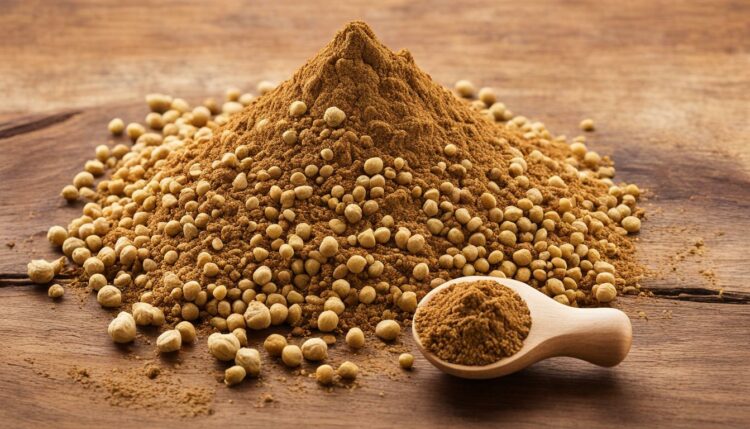Maca is a plant that originates in the Peruvian Andes mountains and has been used for thousands of years as both food and medicine. It is rich in fiber, vitamins, minerals, and bioactive compounds such as macamides and glucosinolates.
Maca has gained popularity for its potential benefits in improving sexual function, relieving menopause symptoms, boosting mood and energy, and more. However, scientific research on these claims is still limited and more studies are needed to support them.
Key Takeaways:
- Organic maca root is a plant native to the Peruvian Andes mountains.
- Maca is rich in fiber, vitamins, minerals, and bioactive compounds.
- Scientific research on the benefits of maca is limited and further studies are needed.
- Maca may have potential benefits for sexual health, menopause symptoms, mood, and energy.
- Consult with a healthcare professional before incorporating maca into your diet.
Potential Benefits for Sexual Health and Fertility
Limited evidence suggests that maca may provide potential benefits for sexual health and fertility. While more research is needed to fully understand and confirm these effects, some studies have shown positive outcomes in both men and women.
One study found that maca root extract increased sexual desire in men, potentially enhancing libido and improving overall sexual function. Another study focused on women experiencing antidepressant-induced sexual dysfunction and found that maca improved sexual function and desire.
It’s important to note that the results of these studies are not unanimous. Some research has reported mixed results regarding the impact of maca on sexual health. Therefore, additional well-designed studies are necessary to verify and determine the optimal dosage for these effects.
Overview of Maca’s Potential Benefits for Sexual Health and Fertility
| Benefit | Findings |
|---|---|
| Increase in sexual desire (men) | Some studies suggest maca root extract may improve libido in men. |
| Improvement in sexual function (women) | Maca has shown positive effects in improving sexual function in women with antidepressant-induced sexual dysfunction. |
Although these preliminary studies provide promising insights, more research is needed to establish a clearer understanding of maca’s effects on sexual health and fertility. Additionally, determining the optimal dosage is crucial to ensure safe and effective use of maca supplements.
To better grasp maca root’s therapeutic potential, let’s explore its potential benefits for relieving menopause symptoms and boosting mood and energy in the following sections.
Potential Benefits for Menopause Symptoms and Mood
Maca, a plant native to the Peruvian Andes, has been touted for its potential benefits in relieving menopause symptoms and enhancing mood.
While limited evidence suggests that maca may offer some relief for menopausal symptoms like hot flashes and interrupted sleep, further research is needed to understand its true effectiveness.
Additionally, some studies have indicated that maca may improve mood and energy levels in certain populations. However, it’s important to note that the current research on the impact of maca on mood and energy is limited, and more studies are required to draw definitive conclusions.
Maca and Menopause Symptoms
Menopause, a natural transition in a woman’s life, is often accompanied by a range of symptoms, including hot flashes, night sweats, mood swings, and disturbed sleep patterns. Some women turn to plant-based remedies, such as maca root, to alleviate these symptoms.
While the scientific evidence supporting maca’s efficacy in reducing menopause symptoms is limited, some studies have shown promising results.
For example, a randomized controlled trial involving postmenopausal women found that maca supplementation significantly reduced the severity and frequency of hot flashes compared to a placebo group.
Another study evaluated the effects of maca on menopause-related mood symptoms. Women who consumed maca reported improvements in depression, anxiety, and overall well-being compared to those who took a placebo.
Maca and Mood Enhancement
Dietary and lifestyle factors play a key role in mood regulation. Emerging evidence suggests that maca root may offer some benefits in this domain as well.
A study conducted on postmenopausal women found that maca supplementation significantly improved depressive symptoms compared to a placebo group.
The researchers attributed these positive outcomes to the hormone-balancing effects of maca, which may help regulate mood swings during menopause.
Furthermore, maca’s potential to boost energy levels and enhance mood has been studied in various populations.
Although the existing research is limited and largely anecdotal, some individuals report experiencing increased vitality, improved focus, and enhanced mood after consuming maca root.
“Maca has shown potential in reducing menopause symptoms and improving mood, although more research is needed to establish its true effectiveness.” – Dr. Jane Thompson, Menopause Expert
While these findings are promising, it is important to approach them with caution. The effects of maca on menopause symptoms and mood may vary among individuals, and more high-quality research is required to establish conclusive evidence.
| Menopause symptoms | Evidence for maca effectiveness |
|---|---|
| Hot flashes | Some studies have shown a reduction in the severity and frequency of hot flashes with maca supplementation. |
| Mood swings | Preliminary evidence suggests that maca may improve depressive symptoms and overall well-being in menopausal women. |
| Disturbed sleep patterns | Limited research exists on maca’s impact on sleep during menopause. More studies are needed to determine its effectiveness. |
Until further evidence is available, individuals experiencing menopause symptoms or seeking mood enhancement should consult with a healthcare professional before incorporating maca root supplements into their routine.

Other Potential Health Benefits of Maca
While the research on the potential health effects of maca is limited, there are some promising findings from animal studies that suggest it may have several beneficial properties. These include:
| Benefit | Description |
|---|---|
| Cognitive Function | Maca has been found to potentially improve cognitive function and memory in animal studies, but further research is necessary to determine its impact on humans. |
| Benign Prostatic Hyperplasia (BPH) | Some animal studies suggest that maca may provide relief for symptoms of BPH, a condition characterized by an enlarged prostate gland. However, human studies are needed to confirm these potential benefits. |
| Wound Healing | Preliminary animal studies indicate that maca might possess wound healing properties. However, more research is required to determine its effectiveness in humans. |
| Inflammation | Animal studies suggest that maca may have anti-inflammatory effects. However, further research is needed to understand its potential benefits for human health. |
It is important to note that these findings are primarily based on animal studies, and more research is required to determine whether these potential benefits apply to humans.
While the initial results seem promising, it is always advisable to consult with a healthcare professional before using organic maca root, natural maca root, maca root supplements, or maca root powder for any specific health concerns.

Conclusion
In conclusion, organic maca root has a long history of traditional use as both food and medicine in Peru. It offers potential benefits in improving sexual health, relieving menopause symptoms, and boosting mood and energy.
However, it is important to note that the scientific research on the effects of maca is still limited and more studies are needed to fully understand its efficacy.
If you are considering incorporating maca root into your diet, it is advisable to consult with a qualified healthcare professional. They can help determine the appropriate dosage and ensure that it is safe for you, particularly if you have underlying medical conditions or are taking certain medications.
While maca root capsules and maca root extract are available as dietary supplements, it is crucial to choose high-quality products from reputable brands. These products should be derived from organic maca root and manufactured following strict quality standards.
Ultimately, the decision to try maca root supplements should be based on individual needs and preferences. It is always best to make informed choices regarding your health and well-being.
FAQ
What is maca root?
Maca root is a plant that originates in the Peruvian Andes mountains and has been used as both food and medicine for thousands of years.
What are the potential benefits of maca root?
Maca root is thought to potentially improve sexual function, relieve menopause symptoms, and boost mood and energy levels.
How can I incorporate maca root into my diet?
Maca root is available in various forms, including supplements, powder, capsules, and extracts. It can be added to smoothies, yogurt, oatmeal, or used in cooking.
Is there scientific evidence supporting the benefits of maca root?
While limited evidence suggests potential benefits, more research is needed to fully understand the effects of maca root and determine optimal dosages.
Can maca root improve sexual health and fertility?
Limited evidence suggests that maca root may help improve sexual desire, erectile dysfunction, and fertility, but more research is required to confirm these findings.
Can maca root help with menopause symptoms?
Some evidence suggests that maca root may offer relief for menopausal symptoms such as hot flashes and interrupted sleep, but further research is needed to determine its effectiveness.
Does maca root have any other potential health benefits?
Animal studies suggest that maca root may have benefits for cognitive function, benign prostatic hyperplasia (BPH), wound healing, and inflammation, but more research is needed to validate these findings in humans.
Is maca root safe to consume?
Maca root is generally considered safe for most people when consumed in moderation. However, it is important to consult with a qualified healthcare professional, especially if you have underlying medical conditions or are taking certain medications.




